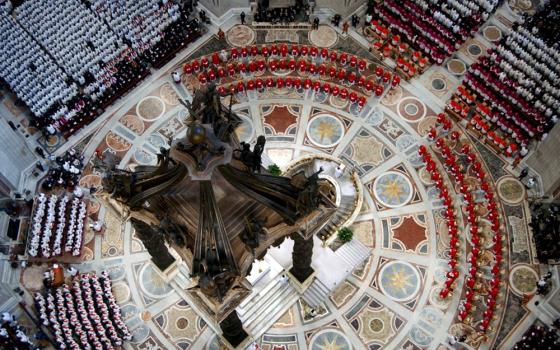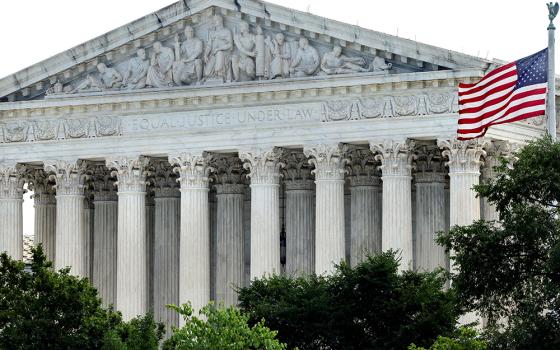Three recent articles were brought to my attention, all of which try to grapple with the themes articulated by Pope Francis. I am indebted to Rocco for providing the first two links and to an unknown sender for the third.
Cardinal Daniel DiNardo offered his thoughts on “the interview” that Pope Francis gave to the Jesuit journals. Cardinal DiNardo writes:
The proclamation of mercy and salvation in Christ is primary in the Church. All teaching, whether doctrinal or moral, grows from this fundamental proclamation and reality. The Holy Father's message here has great simplicity and attractiveness, but also great depth.
Here we see what has been a dominant theme in this pontificate and long a dominant theme at this blog: Religion cannot be reduced to ethics, no matter how badly the cultural terms set by modernity try to push us into that box. Here, too, we see the greatest point of continuity between Pope Francis and his two immediate predecessors, both of whom, in different ways, were rooted in the Communio school of theology we associate with the Henri de Lubac and Hans Urs von Balthasar. The Christian proclamation is first and foremost about God and His accomplishments and only consequently about us and our obligations, moral and otherwise.
This issue is important because it gets to the heart of what Vatican II was all about. The post-conciliar Communio theology grew directly out of the ressourcement theology that preceded the Council and affected it in profound ways. In a book review of David Schindler’s magnificent “Heart of the World, Center of the Church,” which book examined American culture through the Communio lens, I wrote in 1999:
Balthasar was born in Lucerne on August 12, 1905. After finishing his doctoral studies in German literature, he joined the Jesuits and was sent to study in Lyons, where he came under the influence of Henri de Lubac and ressourcement theology. This theology aimed to get past the neo-scholastic Thomism then in vogue by “returning to the sources,” the writings of the Fathers of the Church, those early Christian thinkers from the first five centuries of the Church’s history whose writings have a semi-canonical status within Catholicism.
These early Christian writers did not argue about moral niceties. There were no dry discourses on natural law. There was, instead, great awe at the mystery of the supernatural claims put forth by Jesus, and a rich vocabulary of images and metaphors for understanding those claims. In the writings of the Fathers, the newness of Christianity has not yet been lost: it was fresh, shocking; it challenged traditional philosophical understandings about God and the good. They believed that history was radically altered by, and tending toward a final resolution in, this person of Jesus.
The Fathers of the Church argued about the animating beliefs of Christianity – the Trinity; the nature of Christ; the role of the Virgin Mary. And the ressourcement theologians of the 1950s understood that, while these dogmas were not longer in doubt, they also were no longer in focus. Catholic theology had become a congeries of arcana, designed to provide a ready answer to any and every conceivable human problem; a kind of applied Catholicism, as if the application to the world were the heart of the matter. For Balthasar and his colleagues, however, Christianity is not a moral code organized around natural law; it is a stupendous claim about the supernatural.
The impulse to turn our faith into a “congeries of arcana,” moral, liturgical, political, is the impulse that the Communio school sought to repress, and it is clear that Pope Francis is especially adept at making this point. Cardinal DiNardo grasps this intuition when he writes:
The Church cannot be small and locked up in small-minded rules. She offers a big welcome and even looks for new roads to bring the wandering home. Her major concern is the human person and the love God has for each person. The Church must first accompany each person and only then gently catechize or direct each one. In these expressions and analysis, the Pope is very enthusiastic and emotionally compelling, even rhapsodic!
Rhapsodic! It should surprise no one that Balthasar was deeply concerned with beauty as an attribute of Being. And, it need hardly be pointed out that the Catholicism that results from this genuine wrestling with the enormity of the Christian claim – that God came down from heaven, was born of a woman, walked the earth, was crucified, died and was raised from the dead – is a radical Catholicism that yields people who have been changed, whose consciences are formed at the deepest level to greet the other and the Other greeted us, with love, companionship and self-sacrifice, a people whose horizons go beyond what we can see such that we can even embrace suffering in the sure knowledge that it is redemptive. I have called attention to this before, but when the rev. Dr. Martin Luther King, Jr. stood on the steps of the Lincoln Memorial and referred to the “creative power of suffering,” he was making a dogmatic claim, not an ethical one. There is not an ethicist in the world who can devise an ethics that sees suffering as creative or redemptive. Only the light and the love of Christ make it so.
The second post that caught my eye came from Archbishop Jose Gomez. Who is fast becoming one of my favorite prelates in the land. He wrote a column in The Tidings that repeats the themes articulated above:
More and more, I’m seeing how Pope Francis’ pastoral vision continues the themes of Popes John Paul II and Benedict XVI. As his predecessors did, Pope Francis understands that the Church’s must proclaim Christ to a modern society that is facing a profound moral and spiritual crisis.
It’s not only that many of our neighbors don’t share the Church’s beliefs on fundamental issues such as abortion, sexuality and marriage. This is true and troubling. But those issues are signs of deeper troubles. They are signs that our society has turned away from God to embrace what Pope Francis calls the “idols” of a materialist view of the world.
The Pope wants us to see that these grave issues we face in society are rooted in this deeper materialist worldview — which sees everything only according to what science can prove and what technology can do. Human life is diminished to only material concerns. Life has no higher purpose or direction except to seek to feel better or “more comfortable.”
In the face of these idols, the Church’s preaching and witness must go deeper. We need to speak to our neighbors’ deeper needs, finding new ways to speak to their hearts and mind.
Here, again, the moral truths the Church teaches are given their proper context, as derivative of, and reliant upon, the Church’s central proclamation. And, +Gomez is write to recognize that we need “new ways to speak” because all too often our Catholic leaders, pastoral and intellectual, have fallen into the trap modernity has laid for us: You are welcome into the public square because we know that a good society requires that the citizenry have good morals, and for most people good morals rest upon religion, but you must leave your dogmas at the door because, in a pluralistic society, no one wants a return to the Thirty Years War. That, albeit in truncated fashion, is the role modernity assigns to the Church, a permission slip to enter the halls of public discourse as moral experts, but robbed of our dogmatic claims. Over time, this modus operandi affects, and infects, our self-understanding, and we see ourselves as moral paragons, rather than sinners, and then it is only a matter of time before we are seen as hypocrites, as the religious people who walked past the ailing Samaritan.
+Gomez continues:
The deepest wound in modern life is the wound caused by the loss of God. From this wound come all the other wounds we experience — including the grave moral issues and spiritual confusion we see everywhere.
So the challenge for the Church is to heal these wounds. And as we know, only Jesus can truly heal. So our priority in the Church, in everything we do, must be Jesus Christ. We need to tell our neighbors the good news that Jesus has saved them. We need to show them, by the joyful witness of our own lives, what that salvation means — the beauty of living as children of God in his family, the Church.
The loss of God is “the deepest wound” and we will only help to heal that wound by sowing “the beauty of living as children of God in his family, the Church.” And, watching +Gomez speak in public, whether he is in his pulpit or at a lectern, he always sounds like a pastor, a loving shepherd, the kind of person to whom it would be easy to confess one’s sins and doubts, never a culture warrior.
I would like to end on a happy note, but the third item that came to attention is a post by Msgr. Charles Pope at the website of the Archdiocese of Washington. Msgr. Pope entitled his article “A Reflection on the Modern Error of Preaching Mercy Without Repentence,” and his commentary is half-right and all wrong at the same time. His thesis, in a nutshell, is:
There is much talk of how God loves us, is rich in mercy, is kind and forgiving. And all of these things are true. But another essential truth is that these gifts, these essential attributes of God, are accessed by repentance. It is repentance that opens the door to mercy, forgiveness, and kindness.
This is not entirely wrong – repentance truly does open those doors. But, to find the door in the first place, you need to have someone walking by your side. You need someone who is not so busy wagging their finger at you, indeed you need someone whose love conveys the unconditional love of God. One has the suspicion that, deep down, Msgr. Pope thinks God’s love comes with a thousand conditions.
Msgr. Pope writes, “Faith and repentance are the supernaturally transformed and assisted human element that is necessary to unlock mercy and the graces of God.” I am sure that Cardinal Wuerl has an official theologian, but that smacks of Pelagianism to me. It seems like it is “our faith” and “our repentance” that triggers God’s grace and mercy, but God is always the initiator, it is God who gives us faith, and the grace of repentance, indeed, both faith and a contrite heart are instances of God’s grace, not our achievements. Msgr. Pope mentions that these must be “supernaturally transformed and assisted” but I think he would be more convincing if he led with the supernatural transformation which is exactly what Pope Francis, Cardinal DiNardo and Archbishop Gomez do, lead with God’s love and get to the repentance part when, and only when, the person feels so loved that they can grasp the reason for repentance.
I am sure Msgr. Pope, and other clergy who have a hard time understanding Pope Francis, are familiar with the words of the Act of Contrition: “I detest all my sins because of Thy just punishment but, most of all, because they offend Thee, my God, who art all good and deserving of all my love.” Our need for repentance, our sins, stink not because they violate the rules, but because they harm our relationship with the One who loves us and who deserves “all of my love.” In a world that has grown forgetful of God, Pope Francis and those who “get” him, understand that the Church must preach God’s love, and let the other things come in time. This is not an error, modern or otherwise, as Msgr. Pope suggests. It is the New Evangelization and it is catching fire.






